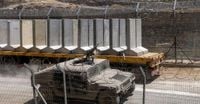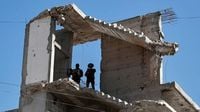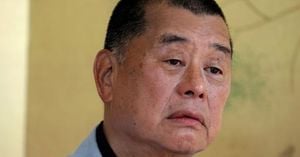On August 26, 2025, the skies over southern Damascus erupted with violence as Israeli drone strikes targeted the suburb of Kiswah, killing at least eight Syrian soldiers and wounding several others, according to state-run El Ekhbariya TV and the Syrian Observatory for Human Rights. The attack marks the latest escalation in a volatile region still reeling from the aftermath of Bashar al-Assad’s ouster in December 2024, and comes amid mounting international concern over Israel’s expanding military operations inside Syria.
Syria’s Foreign Ministry wasted no time in condemning the strikes, labeling them “a grave violation of international law” and “a clear breach of (Syria’s) sovereignty and territorial integrity.” In a statement echoed by multiple outlets, the ministry asserted, “It also comes in the context of the repeated aggressive policies pursued by the Israeli occupation aimed at undermining security and stability in the region.” The language was unequivocal, reflecting deepening frustration in Damascus as Israeli operations inside Syria have become both more frequent and more brazen since Assad’s fall.
The strikes in Kiswah, verified by video footage analyzed by Al Jazeera’s Sanad fact-checking agency, hit a site linking Damascus to the southern province of Suweida. This area has itself been a flashpoint, witnessing deadly clashes in July between pro-government gunmen and fighters from Syria’s Druze minority. According to the Syrian Observatory for Human Rights, the attacks included multiple drone strikes, one of which reportedly hit after paramedics had arrived on the scene. In addition to the eight soldiers killed, three others were wounded, underscoring the ferocity and precision of the operation.
Earlier that same day, Israeli drones struck near Quneitra, a town close to the Golan Heights, killing one person. Syria’s Foreign Ministry condemned this strike as well, arguing it “threatens peace and stability in the region.” The Israeli military, for its part, declined immediate comment on either incident, maintaining its longstanding policy of ambiguity regarding operations in Syria.
Since December 2024, Israel has carried out hundreds of airstrikes across Syria, targeting military assets and infrastructure once controlled by Assad’s regime. Israeli forces have also seized a significant portion of the United Nations-patrolled demilitarized buffer zone in southern Syria, including the summit of Mount Hermon—a move that Syria says violates the 1974 disengagement agreement. On August 25, Syrian officials accused Israel of sending 60 soldiers into territory near Mount Hermon, a strategic hilltop close to the Lebanese border. While Israel described the move as a routine operation, Syria’s Foreign Minister Asaad al-Shibani denounced it as a “military incursion” and part of Israel’s “expansionist and partition plans.”
The recent violence comes as Syria and Israel are engaged in US-mediated talks aimed at de-escalating tensions in southern Syria. Last week, Foreign Minister al-Shibani met with Israeli Strategic Affairs Minister Ron Dermer in Paris to discuss a possible return to the arrangements established by the 1974 disengagement agreement. The discussions are seen by some as a tentative step toward broader political negotiations, though the mood on the ground remains tense.
Israeli Defense Minister Israel Katz took to social media on August 27 to clarify Israel’s intentions. “Israeli forces will remain indefinitely in the security zone necessary to protect the Golan and Galilee settlements from threats looming from the Syrian side,” Katz wrote on X (formerly Twitter). He framed the deployment as a direct response to lessons drawn from the Hamas-led attack on southern Israel on October 7, 2023, adding, “The Israeli military will continue to protect the Druze in Syria as well.” His comments highlight Israel’s dual concerns: safeguarding its own borders and protecting the Druze, a community of about one million people spread across Syria, Lebanon, and Israel. The Druze are seen as a loyal minority within Israel, with many serving in the Israeli military, and have recently been caught in the crossfire of Syria’s ongoing sectarian violence.
This rationale for intervention has not convinced Syria or its allies. The strikes have drawn condemnation not only from Damascus but also from regional powers. The Saudi foreign ministry described Israel’s actions as a “flagrant violation of the sovereignty of the sisterly Syrian Arab Republic and international law.” Qatar’s foreign ministry called on “the international community to take decisive action against the Israeli occupation and compel it to halt its repeated attacks on Syrian territory.” Both statements reflect growing alarm in the Arab world over the potential for the conflict to spiral further out of control.
Meanwhile, the situation on the ground in southern Syria remains deeply unsettled. The Kiswah strikes targeted a road that connects Damascus to Suweida, an area that saw 1,400 people killed in a single week of sectarian violence in July, according to Al Jazeera. Israel has justified its recent attacks as necessary to protect the Druze community, but Syrian officials argue that these interventions only inflame existing tensions and undermine the country’s sovereignty.
Adding another layer of complexity, Israeli forces reportedly conducted a landing operation at the former army barracks in Kiswah on August 27, using four helicopters to insert dozens of soldiers and search equipment. According to a Syrian military source cited by Al Jazeera, the operation lasted over two hours and, notably, did not result in direct clashes between Israeli and Syrian troops. The Israeli military has remained tight-lipped about the details, but the scale and sophistication of the operation suggest a significant escalation in Israel’s willingness to project force inside Syria.
Since the fall of Assad, the balance of power in southern Syria has shifted dramatically. Israel’s occupation of much of the UN-patrolled demilitarized zone, including the summit of Mount Hermon, marks a new phase in the long-running conflict between the two countries. While Israel insists its actions are motivated by security concerns and a desire to protect minorities, Syria and its allies view them as part of a broader strategy to redraw borders and assert control over strategically vital territory.
With both sides digging in and regional powers weighing in, the prospects for a diplomatic breakthrough remain uncertain. The ongoing US-mediated talks offer a glimmer of hope, but as the events of August 26 and 27 show, the risk of further escalation is never far away. For now, the people of southern Syria are left to navigate the fallout from yet another round of violence, as the world watches and waits to see what comes next.





